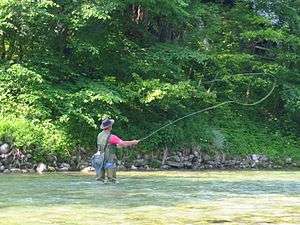Angling Trust
The Angling Trust, based at Leominster, Herefordshire, is an organisation formed from the merger of six angling authorities to form a single and more powerful organisation for the benefit of anglers. The body oversees the development of angling for three disciplines — coarse, sea, and game fishing. The Angling Trust was set up to promote anglers' rights, fish conservation, preservation of habitat and fish and angler welfare.
Formation of the Angling Trust
In 2009, after two years of discussion, six Angling organisations merged to create the Angling Trust: the Anglers' Conservation Association (now Fish Legal[1]), the Fisheries and Angling Conservation Trust (FACT),[2] the National Association of Fisheries and Angling Consultatives (NAFAC),[3] the National Federation of Anglers (NFA),[4] the National Federation of Sea Anglers (NFSA),[5] and the Specialist Anglers' Alliance (SAA).[6]
The Salmon & Trout Association (S&TA) pulled out of the merger consultations owing to wishing to keep its charitable status: under the law of England and Wales, charities are not allowed to merge.[7] The Angling Development Board merged with the Angling Trust in 2012.[8]
Aims
The Angling Trust is run primarily for the protection of angling. The body encourages increased government support and Environment Agency protection for angling and fisheries, as well as the prevention of fish disease and parasites. Other issues include the control of nuisance predators, co-ordinated action on poaching and fish theft, and the provision of education and coaching to people in the wider community. The AT runs national and international competitions, and assists the development of angling clubs.[8]
British Record (Rod Caught) Fish Committee
The Angling Trust incorporates the British Record (Rod Caught) Fish Committee which oversees and adjudicates the British Record Fish list for saltwater, game and freshwater fish caught by rod and line method.[9]
Fish Legal
Fish Legal represents the Angling Trust in cases brought against polluters, those who contribute to the problem of litter, over-abstraction, commercial overfishing, habitat degradation, poaching, fish theft, unlawful navigation, the erection of barriers such as weirs, and hydropower schemes designed with inappropriate concern for anglers or fish welfare. One case in which the body has acted was on behalf of the Pride of Derby & Derbyshire Angling Association to preserve fishing rights in the local weir from developers.[11]
References
- "Fish Legal". fishlegal.net. 2014-10-18.
- "Fisheries and Angling Conservation Trust (FACT)". factuk.co.uk. 2014-10-18. Archived from the original on 2011-04-14. Retrieved 2014-10-19.
- "National Association of Fisheries and Angling Consultatives (NAFAC)". ribble fisheries.ca.co.uk. 2014-10-18.
- "National Federation of Anglers (NFA)". cambridge fpas. 2014-10-18.
- "National Federation of Sea Anglers (NFSA)". nfsa.org.uk. 2014-10-18.
- "Specialist Anglers' Alliance (SAA)". saauk.org. 2014-10-18.
- "Any dream will do of a future with one voice". the times.co.uk. 2014-10-18.
- "About the Angling Trust". Angling Trust. 2014-10-19.
- "Angling Trust - British Record Fish Committee Aims and Objectives". Angling Trust. 2017.
- "Angling Trust - Historic landmark legal victory". Anglers Mail. 2014-10-18.
